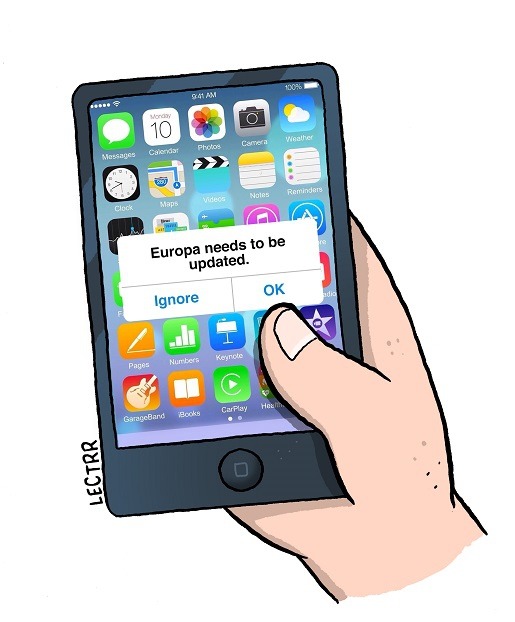If you wander through the streets of Brussels, you’ll see people glued to their smartphones – checking email, finding their way with Google Maps, hailing an Uber, chatting on WhatsApp, watching YouTube videos, posting on Facebook, Twitter and Instagram, and so much more. As consumers, Europeans generally embrace new digital technologies. But on the productive side, Europe is a laggard. With a few notable exceptions such as Skype and Spotify, the internet revolution has largely happened elsewhere.
While there are lots of wonderful digital start-ups in Europe, the EU is still far behind the United States. The giants that dominate our new digital world – Apple, Google, Amazon, Facebook, Twitter, Netflix, eBay, PayPal, WhatsApp, LinkedIn, Uber, Airbnb – are almost all American. There is no European equivalent of California’s Silicon Valley; London’s Tech City and Berlin’s Silicon Allee are tiny in comparison.
To make matters worse, while European consumers tend to rapidly adopt new digital technologies, European companies often don’t. Remember how long it took to introduce 4G mobile internet in Brussels? That delay wasn’t just frustrating for phone users; it also stunted local start-ups that needed high-speed mobile broadband to provide their services. Indeed, the EU’s digital backwardness is a big reason why productivity is lower than in the US – and that makes Europeans poorer too.
Europe urgently needs to up its game. But while digital is a priority for the European Commission, its corporatist proposals are deeply flawed. For the most part, they seek to prop up established companies, instead of opening up opportunities for tomorrow’s dynamic digital upstarts to flourish. That hinders progress and gives Europeans a raw deal.
There are many reasons for Europe’s digital failings. But among the biggest is the stranglehold that vested interests – notably, incumbent companies, both big and small – often have over cartelised markets and corporatist political systems. The market power of established firms is entrenched by regulation that limits competition, impedes the formation of new businesses and stunts the growth of challenger companies. Tellingly, whereas in the US, twenty of the 100 most valuable listed companies were founded over the past 40 years, not a single one of Europe’s top 100 was.
Without upstarts breathing down their necks, entrenched incumbents have less incentive to invest in new technologies and upgrade their products and services. Just contrast the cosy situation in Belgium, where the three mobile providers can get away with charging high prices for poor service, with France, where an upstart called Free Mobile has shaken up the market to the benefit of consumers and companies that rely on mobile services.
The red tape that protects established companies prevents the emergence of digital challengers, such as a would-be European Amazon or Uber. Amazon began as a discount online bookseller; had it been started in the EU, it could never have gained scale in the many European countries that fix book prices. Likewise, a putative European Uber could never get going in countries where politically powerful taxi-driver lobbies can roadblock new rivals. To protect yesterday’s companies, Europe is sabotaging its future.
The problem isn’t just the lack of an EU single market in many offline services that would benefit from digital disruption; it’s restrictions on competition at a local level too. Many European cities have banned Uber or limited people’s ability to rent out their homes on Airbnb. In France, where transport between cities is highly regulated, BlaBlaCar, a car-sharing service, skirts around the restrictions by stipulating that people hitching a ride only share the travel costs, rather than enabling drivers to earn a profit.
The costs of ossifying Europe’s economic structure are less severe in mature industries where improvements are incremental. The market for paper clips, for instance, doesn’t change much each year in any case. But the costs of impeding change are vast in areas where innovation is rapid and disruptive. Before the internet age, international telephone calls were prohibitively expensive; now Skype and other internet call services provide video calls for free. As well as being great for keeping in touch with friends and family abroad, free video calls enable companies to provide all sorts of services to people in different countries, from language lessons to life coaching and much else besides. Just think what we would be missing out on if telecoms companies had succeeded in blocking Skype!
As more and more sectors of the economy become ripe for a digital revolution, the costs of Europe’s cosseting of established companies are mounting. Consider cars. Until recently, the car industry was mature and slow moving: vehicles got gradually better each year but didn’t change much. Now, suddenly there is the potential for revolutionary change. Clean electric cars could displace dirty ones fuelled by diesel and petrol. Connected cars could harness mobile communication technologies to offer both drivers and passengers better information, entertainment, safety, navigation and other services. Self-driving cars could provide everyone an electronic chauffeur, liberate space in cities, free up commuting time and slash the number of road deaths caused by human error.
Those would be huge benefits. But this potential for dramatic, disruptive change is disturbing for established car companies. They remember what happened to Nokia: the Finnish company dominated the global mobile-phone market until Apple’s iPhone and Google’s Android came along and the ensuing smartphone revolution blew it away. Might an electric-car company like Tesla soon eat their lunch too? Might connected cars become like smartphones, where most of the profits go to the providers of the operating system and the app store, rather than the manufacturers of the physical commodity? Might Google’s – or Uber’s – autonomous cars drive traditional European cars off the road altogether?
Yes, they might – and to avoid getting overtaken, European carmakers need to put their foot on the accelerator. But because they fear they are going to lose the race, they are trying to throw sand in their rivals’ gears instead. And since both national and EU policymakers are beholden to car lobbies – cars are Germany’s biggest exports and Germany is the EU’s most powerful member – car companies that feel threatened by change that would benefit European citizens and the rest of the economy are dictating public policy.
But what’s good for Volkswagen isn’t necessarily good for Europe as a whole. For years, Germany’s biggest car company has poisoned our air by fitting illegal devices that enabled its dirty diesel engines to cheat EU emissions standards. And what happened when this deceit was discovered? Even though nitrogen oxide pollutants are known to cause respiratory diseases and other health problems, the European Parliament decided to raise permitted emissions levels instead of insisting that Volkswagen produce cleaner cars and take dirty ones off the road.
This corporatist approach that prioritises the interests of existing companies over the public interest has infected the EU’s digital policy too. The EU’s digital commissioner, Germany’s Günther Oettinger, unabashedly seeks to advance German business interests. Not the interests of German digital start-ups stunted by domestic red tape, underinvestment and a risk-averse culture, but those of the dinosaurs from the analogue age who feel threatened by American competition and are looking to Brussels for protection. “It must not happen that Google makes future products such as cars or televisions and European companies remain the role of the supplier [sic],” he says.
Of course, it would be great if European companies were successful. But the best way to achieve that is not to protect existing companies that cannot compete, but to open up opportunities for dynamic challengers that may displace the dinosaurs or spur them to reinvent themselves for a digital age. And the most important thing is that Europeans are able to benefit from digital progress. Even if American companies do end up capturing a big chunk of the market, Europeans would still be better off. After all, would you swap your iPhone or Android for a clunky old Nokia?
By Philippe Legrain


